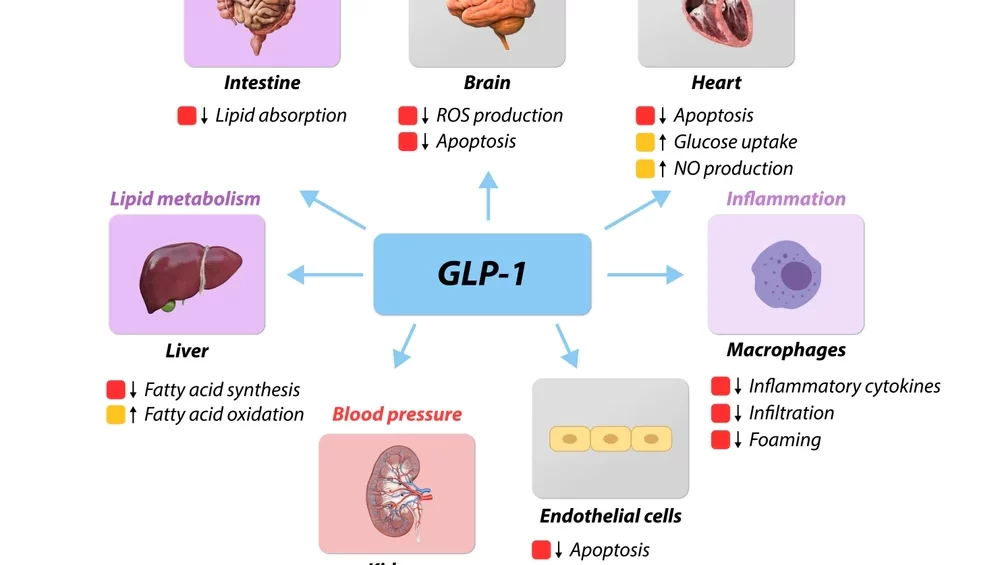How GLP-1 Medications Work has become an important topic in the world of weight management, where options for medications and supplements can feel overwhelming. With countless products promising quick fixes and drastic results, it’s crucial to understand the science behind each approach. GLP-1 medications stand out for their effectiveness and unique mechanism, representing more than just another weight loss trend. Instead, they mark a true breakthrough in how we understand and manage weight. But how do these drugs differ from the traditional diet pills so many people know? Let’s explore the science behind GLP-1 medications and see why they stand apart in modern weight loss solutions.
GLP-1, or Glucagon-Like Peptide-1, is a hormone that plays a crucial role in regulating appetite and blood sugar levels. This hormone is naturally produced in the intestines in response to food intake, signaling the body to feel full and satisfied, thereby curbing overeating. GLP-1 medications are a class of drugs that mimic the action of this naturally occurring hormone. They are primarily used to treat type 2 diabetes but have also shown significant promise in aiding weight loss. By harnessing the body’s natural processes, these medications offer a method of weight management that aligns with biological functions rather than fighting against them.
How GLP-1 Medications Work
GLP-1 medications work by enhancing the body’s natural GLP-1 hormone effects. This hormone is released in response to food intake and serves several functions:
- Appetite Reduction: GLP-1 slows down the emptying of the stomach, leading to a feeling of fullness. This helps reduce overall food intake. By prolonging the digestion process, individuals experience satiety, which reduces the likelihood of snacking or overeating between meals.
- Blood Sugar Control: By stimulating insulin secretion and reducing glucagon release, GLP-1 helps maintain steady blood sugar levels. This is particularly beneficial for individuals with type 2 diabetes, as it helps stabilize glucose levels without drastic spikes or drops.
- Brain Signaling: GLP-1 acts on the brain to suppress hunger signals, further aiding in reducing calorie consumption. This central action on the brain’s appetite centers is a key differentiator from other weight loss medications that do not address neurological aspects of hunger.
These actions make GLP-1 medications highly effective for weight management, especially in individuals who struggle with overeating or have difficulty managing their appetite. By targeting multiple pathways, these medications offer a comprehensive approach to weight loss that addresses both physical and psychological aspects of hunger.
Traditional Diet Pills: A Contrast
Traditional diet pills often work through different mechanisms compared to GLP-1 medications. They are typically formulated to deliver quick results but may not address the underlying causes of weight gain. Many over-the-counter diet pills focus on:
- Stimulants: Ingredients like caffeine increase metabolism and energy expenditure but can lead to side effects such as increased heart rate and jitteriness. These stimulant-based pills often provide a temporary boost in energy, which may contribute to short-term weight loss but are not sustainable in the long run.
- Appetite Suppressants: These pills aim to reduce hunger but often do not address the underlying hormonal signals that control appetite. As a result, users may experience temporary relief from hunger but may not see significant changes in eating habits or weight.
- Fat Blockers: Some diet pills prevent the absorption of fats in the digestive tract, which can lead to gastrointestinal issues. While these can reduce calorie intake from fats, they may also interfere with the absorption of essential nutrients, leading to potential deficiencies.
While traditional diet pills can offer short-term weight loss, they often lack the comprehensive approach provided by GLP-1 medications. Moreover, the side effects associated with stimulants and fat blockers can be a significant drawback for many users. The temporary nature of these solutions often leads individuals to cycle through different products without achieving lasting results.
The Science Behind How GLP-1 Medications Work
Efficacy and Research
Research has shown that GLP-1 medications are effective in promoting weight loss and improving metabolic health. Clinical trials have demonstrated that these drugs can result in significant weight loss when combined with lifestyle modifications like diet and exercise. This combination not only enhances the effectiveness of the medication but also encourages sustainable lifestyle changes that support long-term health.
One of the reasons for their effectiveness is the dual action on appetite and blood sugar control. By addressing both of these areas, GLP-1 medications provide a more holistic approach to weight management. This multifaceted mechanism of action means that patients can experience improvements in both weight and overall metabolic health, reducing the risk of complications associated with obesity and diabetes.
GLP-1 Side Effects
Like any medication, GLP-1 drugs come with potential side effects. However, many users find these manageable and temporary. The most common include:
- Nausea: This is often temporary and can be managed by starting with a lower dose and gradually increasing it. Many patients find that as their body adjusts, nausea subsides, allowing them to continue the medication comfortably.
- Vomiting and Diarrhea: These symptoms may occur but typically lessen over time. It’s important for patients to stay hydrated and consult their healthcare provider if symptoms persist.
- Hypoglycemia: Although rare, low blood sugar can occur, particularly when combined with other diabetes medications. Regular monitoring of blood sugar levels can help mitigate this risk and ensure safe use of the medication.
Despite these side effects, many patients find the benefits of GLP-1 medications outweigh the drawbacks, especially when managed under medical supervision. The ability to achieve significant weight loss and improved metabolic health often justifies the temporary discomfort associated with starting the medication.
Who Can Benefit From GLP-1 Medications?
GLP-1 medications are particularly beneficial for individuals with type 2 diabetes or those who are overweight and struggle with appetite control. These medications offer a solution for those who have not achieved desired results through diet and exercise alone. They are often prescribed when lifestyle changes alone do not lead to sufficient weight loss, providing an additional tool in the weight management arsenal.
Personalized Medical Advice
Understanding how GLP-1 medications work is only one part of the journey; consulting with healthcare professionals is just as essential. Personalized medical advice ensures these medications are suitable based on an individual’s unique health conditions and that they are used safely and effectively. By evaluating how GLP-1 medications work in each patient’s situation, healthcare providers can create tailored treatment plans that maximize results while minimizing risks. Regular follow-ups allow for dosage adjustments and close monitoring of progress, ensuring the entire process remains safe, effective, and aligned with long-term health goals.
GLP-1 vs. Traditional Diet Pills: Making the Choice
Choosing between GLP-1 medications and traditional diet pills depends on various factors, including health goals, medical history, and personal preferences. Here are some considerations:
- Long-Term Health Goals: GLP-1 medications are better suited for those looking for sustainable weight loss and improved metabolic health. These drugs are designed to work in harmony with the body’s natural processes, supporting gradual and lasting changes.
- Side Effect Profile: Traditional diet pills may offer quick results but often come with unwanted side effects. Understanding the potential risks and benefits of each option is crucial for making an informed decision.
- Medical Supervision: GLP-1 medications require a prescription and should be used under medical guidance, while many traditional diet pills are available over the counter. This distinction emphasizes the importance of professional oversight in achieving safe and effective weight loss.
Conclusion
How GLP-1 Medications Work represents a significant advancement in weight management therapy. By mimicking natural hormonal processes, they provide a more comprehensive and effective approach compared to traditional diet pills. Addressing the root causes of weight gain, these medications offer a multifaceted treatment path that paves the way for more successful long-term strategies. While both diet pills and prescription therapies have their place, understanding how GLP-1 medications work highlights why they stand out as a promising option for sustainable weight loss.
Incorporating GLP-1 medications into a weight management plan should always be guided by healthcare professionals to ensure safety and effectiveness. As research continues to expand, these therapies are poised to become an even more essential part of managing weight and metabolic health. The future of weight management lies in personalized, science-driven solutions that improve long-term outcomes and enhance quality of life.






